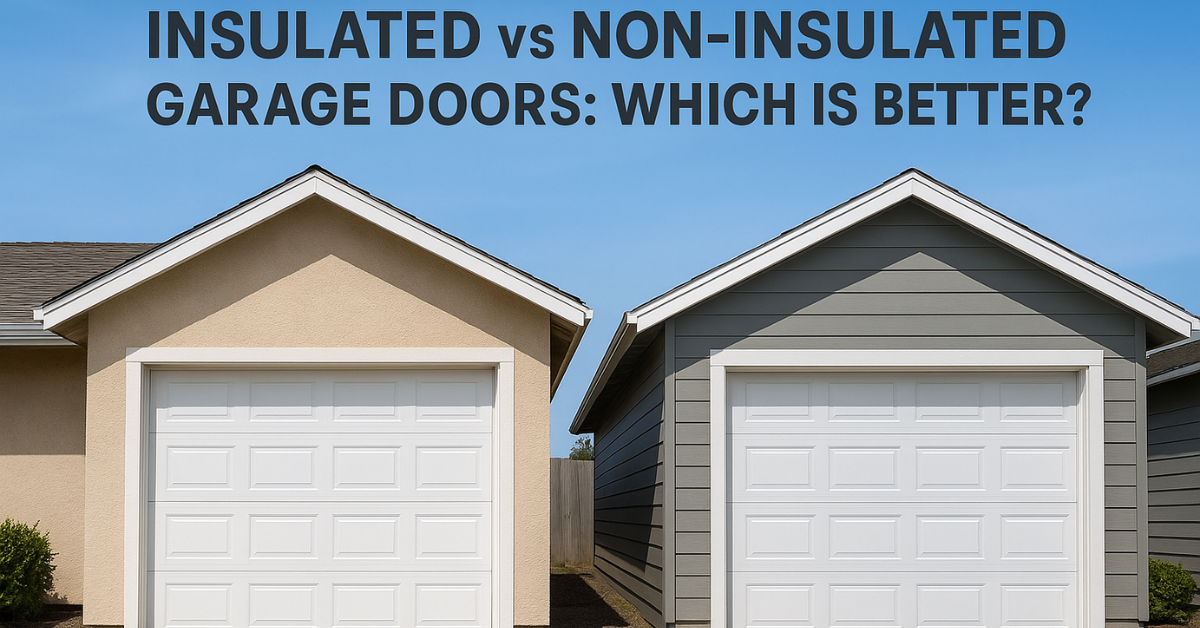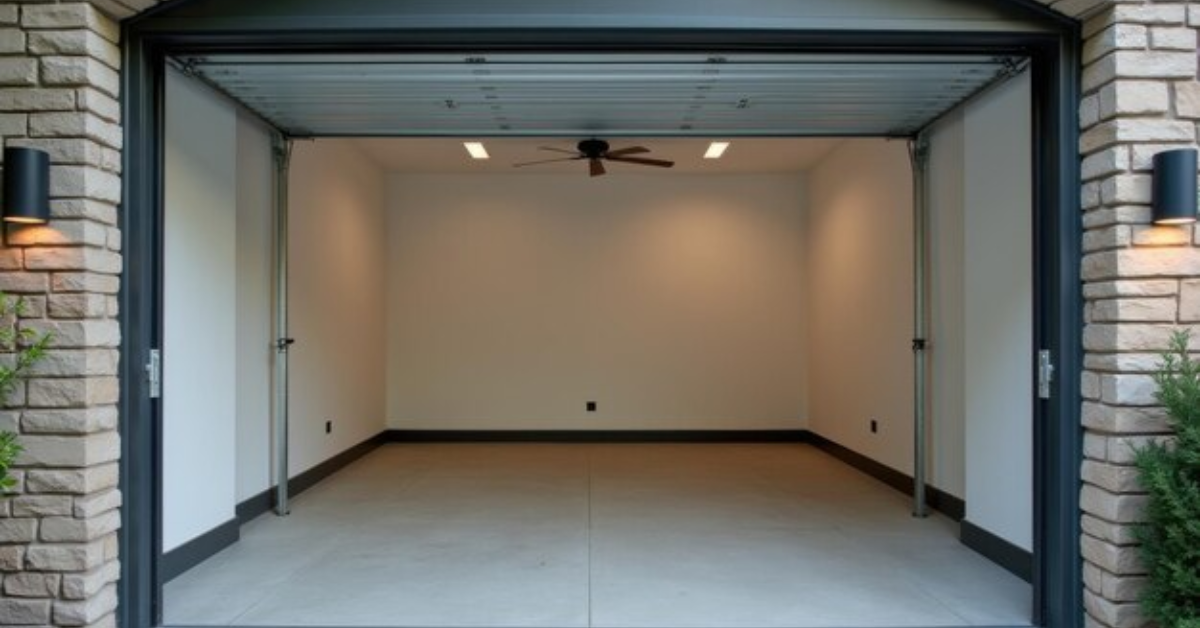Insulated vs Non-Insulated Garage Doors: Which Is Better?
When it comes to garage doors, one of the most common questions homeowners face is whether to choose an insulated or non-insulated option. At first glance, the difference might seem minor — after all, both serve the same basic function of opening and closing your garage. But when you dig deeper, insulation plays a huge role in comfort, energy efficiency, and long-term savings.
In this article, we’ll break down the pros and cons of insulated vs non-insulated garage doors, helping you decide which is the better fit for your home and lifestyle.
Understanding the Basics
What Is an Insulated Garage Door?
An insulated garage door has one or more layers of insulation material sandwiched between its panels. The insulation can be made from polystyrene or polyurethane foam — both designed to reduce heat transfer. These doors often have a higher R-value, which measures thermal resistance, meaning they keep your garage warmer in the winter and cooler in the summer.
What Is a Non-Insulated Garage Door?
A non-insulated garage door, on the other hand, typically consists of a single layer of steel or aluminum with no thermal protection. While it’s lighter and more affordable, it doesn’t regulate temperature as effectively and can be noisy or prone to dents.
Energy Efficiency and Comfort
If your garage is attached to your home or used as a workspace, insulation becomes a big deal. Energy-efficient garage doors help maintain consistent temperatures, reducing the strain on your HVAC system.
For example, during winter, an insulated garage door can prevent cold air from seeping into adjacent rooms, lowering your heating bills. In summer, it helps block excessive heat from entering, keeping your home comfortable.
In contrast, non-insulated garage doors allow more heat transfer. If you open your garage frequently or spend time there doing projects, the difference in comfort will be immediately noticeable.
Noise Reduction and Durability
Another underrated advantage of an insulated garage door is noise reduction. The layers of insulation act as a sound barrier, minimizing outside noise — ideal if your garage faces a busy street or if you use power tools inside.
These doors also tend to be more rigid, offering better protection against dents and impacts. The insulation adds structure, making the door feel sturdier and more durable.
Meanwhile, non-insulated garage doors are thinner and more prone to rattling, especially in windy weather. While they work fine for detached garages or storage spaces, they might not offer the same level of quietness or resilience.
Cost Comparison
When comparing insulated vs non-insulated garage doors, cost is often the deciding factor.
- Non-insulated garage doors are typically cheaper upfront, making them an attractive option for budget-conscious homeowners or for garages that don’t require temperature control.
- Insulated garage doors, however, offer long-term savings. Though the initial price is higher, the improved energy efficiency can reduce your utility bills over time.
If you plan to stay in your home for several years, investing in insulation could pay off through comfort and lower energy costs.
Appearance and Value
From a curb appeal standpoint, insulation doesn’t directly affect how your garage door looks — but it can improve how it feels and performs. Insulated doors often close more smoothly, feel solid to the touch, and make your garage space more inviting.
Additionally, upgrading to an energy-efficient garage door can boost your home’s resale value. Buyers increasingly appreciate features that contribute to energy savings and comfort.
On the other hand, non-insulated garage doors can still look appealing and come in a wide range of designs, but they may not offer the same perceived quality or performance benefits.
When to Choose an Insulated Garage Door
Opt for an insulated garage door if:
- Your garage is attached to your home.
- You use the garage as a workspace, gym, or laundry area.
- You live in a region with extreme temperatures.
- You want to reduce outside noise.
- You’re planning to stay in your home long-term and value comfort.
These factors make insulation a smart, energy-efficient choice that adds convenience and value.
When to Choose a Non-Insulated Garage Door
A non-insulated garage door might be sufficient if:
- Your garage is detached and not connected to your living space.
- You use your garage solely for vehicle storage.
- You live in a mild climate.
- You’re working with a tight budget.
In these cases, you can save money upfront without sacrificing much in terms of function.
Final Verdict: Which One Is Better?
When comparing insulated vs non-insulated garage doors, the best choice depends on your specific needs.
If you prioritize comfort, noise reduction, and long-term efficiency, an insulated garage door is worth the investment. It adds year-round temperature control, improves durability, and enhances your home’s overall value.
However, if your garage is purely utilitarian — say, a detached unit used for parking or storage — a non-insulated door can still serve you well at a lower cost.
Ultimately, think about how you use your garage and the climate in your area. While insulation might seem like a small feature, it can make a significant difference in your daily comfort and home efficiency.
FAQs About Insulated vs Non-Insulated Garage Doors
Q1. Is an insulated garage door worth the extra cost?
A: Yes, especially if your garage is attached to your home or used frequently. The energy savings and comfort it provides often outweigh the higher upfront cost.
Q2. Can I add insulation to an existing garage door?
A: Absolutely. Insulation kits are available for most standard garage doors, allowing homeowners to improve efficiency without replacing the door.
Q3. How long do insulated garage doors last?
A: With proper maintenance, insulated garage doors can last 15–30 years, depending on material quality and usage.
Q4. Do insulated garage doors make a difference in winter?
A: Yes, they help maintain warmer temperatures inside your garage, reducing cold drafts that can affect nearby rooms.
Q5. Are non-insulated garage doors still a good option?
A: Yes, for detached garages or mild climates, a non-insulated door offers a cost-effective solution with less maintenance.
Conclusion
The debate between insulated vs non-insulated garage doors boils down to comfort, energy efficiency, and usage. Insulated doors provide greater benefits in most scenarios — from noise reduction to temperature control — while non-insulated ones remain an affordable choice for simple storage needs.
Whichever you choose, understanding the pros and cons ensures your garage door investment fits both your lifestyle and your budget.

You might also like
Fix N Go Blog



